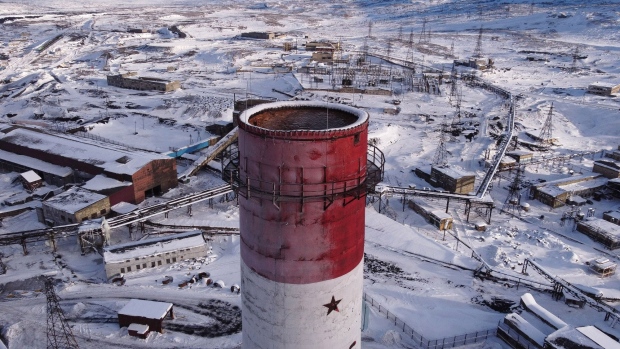Apr 20, 2021
Russian Lawmakers Back The Nation’s First Ever Climate Law
, Bloomberg News

(Bloomberg) -- Russia, the world’s fourth-largest polluter and country often criticized for unambitious climate goals, has made its first step towards carbon trading and a detailed monitoring of its greenhouse gas emissions.
The State Duma, the lower chamber of the Russian parliament, has approved in the first reading the draft law that creates a framework for climate projects in the country, and allows to trade carbon units that result from emission cuts or absorption.
The bill also requires the nation’s largest polluters, companies that emit the annual equivalent of at least 150,000 tons of CO2, to report their emission levels to regulators. From 2025, that threshold is to be lowered to at least 50,000 tons. Pollution monitoring by company and industry will allow the nation to set targets for emission cuts, the bill says.
The draft law is “part of our international obligations within the Paris Agreement, it’s our new climate policy,” Prime Minister Mikhail Mishustin said when presenting it to the government in February. “It’s for the first time that we are adopting such a regulatory act.”
The bill still requires two more readings in the Duma as well as approval from the upper chamber of parliament and president Vladimir Putin. The economy ministry, which drafted the law, expects the regulation to come in force from 2022.
Russia, which joined the Paris Agreement two years ago, so far has made few steps toward meeting the accord’s goal of net zero global emissions by 2050, aiming instead to develop a ‘low-carbon economy’ in the next three decades. That compares to the European Union, Japan, or South Korea which target carbon neutrality by 2050.
According to Putin’s order issued last year, by 2030 Russia is set to reduce its emissions by 70% compared to its 1990 level. Yet thanks to an economic downturn in the late 1990s and early 2000s, which led to a decline in industrial production, Russia is already comfortably within the target range.
Carbon Tax Plans
However, the nation is alarmed by the EU’s plan of a cross-border carbon tax, which may affect some of its key raw-material producers and exporters, including miners. Their losses may reach as much as $8 billion every year, according to Russian industry estimates.
Russia’s economy ministry expects the introduction of carbon-offset trading will help mitigate any potential negative effects of cross-border carbon taxes, minister Maxim Reshetnikov said last week in the Duma during the discussion of the bill. “It’s important that Russian carbon units, and consequently lower carbon footprint, is recognized in the international markets,” he said.
The country aims to begin trialling an emission trading system in the remote Far East region of Sakhalin next year, Deputy Economy Minister Ilya Torosov told Bloomberg in March. The goal is to have the region become carbon neutral by 2025, Torosov said.
Putin will outline Russia’s approach to the climate change in his videolink address at the summit organized by U.S. counterpart Joe Biden on Thursday, according to a statement by the Kremlin.
©2021 Bloomberg L.P.


